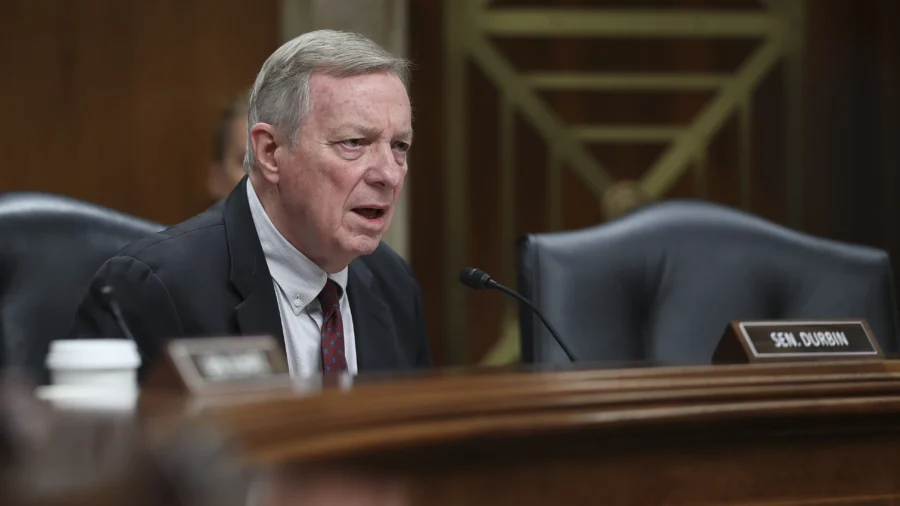The Democrat-controlled Senate Judiciary Committee voted—after three previous postponements—to subpoena two private citizens connected to conservative Supreme Court justices, as part of probe of gifts and personal hospitality provided to members of the nation’s highest court.
The roll call vote of 11–10 went along party lines and came at the conclusion of a rancorous two-hour committee business meeting on Nov. 30. Republicans accused Democrats of abusing their power on the committee and of trying to delegitimize the Supreme Court because its current conservative-leaning majority has issued decisions that Democrats don’t like.
The committee authorized subpoenas for billionaire Republican donor Harlan Crow and conservative activist Leonard Leo in connection with the committee’s ongoing Supreme Court ethics investigation. Committee chairman Sen. Dick Durbin (D-Ill.) has said the two have refused to cooperate with the ongoing probe.
Mr. Crow is a close friend of Justice Clarence Thomas and has given him expensive gifts, including vacations. No evidence has been presented that the justice’s vote in any case before the court has been influenced by Mr. Crow’s personal generosity toward him. While Justice Thomas has said he was advised he didn’t have to report the gifts, he has vowed to do so going forward.
Mr. Leo is chairman of The Federalist Society, a lawyers’ group that favors adherence to the Constitution and advocates for conservative, constitutionalist nominees for the bench. A committee statement described Mr. Leo as an “orchestrator of right-wing influence campaigns around the Supreme Court.”
While the committee had also sought a subpoena against Robin Arkley II, Mr. Durbin said on Nov. 8 the panel wouldn’t vote on subpoena authorization against him because he “provided the committee with information that he had been withholding.”
Mr. Arkley is a conservative donor who is president and CEO of the Security National Master Holding Co., a mortgage company.
At the meeting, Republicans questioned the motives of the Democrats in pursuing the subpoenas.
“The subpoenas are never going to see the light of day,” said ranking GOP member Sen. Lindsey Graham (R-S.C.).
“You know you’re not going to get 60 votes for these subpoenas,” he said, referring to the voting threshold needed to overcome a filibuster in the full Senate.
Democrats are engaged in a “jihad” against the court, he said.
“It’s despicable what they’re doing to these people,” he said, referring to those targeted with subpoenas.
“The subpoenas serve no legislative purpose,” Mr. Graham said.
“This is designed to get people they don’t like. They’re using this committee as a political vendetta.”
At the meeting, Democrats, who accuse the Supreme Court of being overly sympathetic to business interests and conservative causes, expressed dissatisfaction with the new code of conduct that the court unexpectedly unveiled on Nov. 13.
“The court’s new code of conduct falls far short of what we would expect from the highest court in the land,” Mr. Durbin said.
“While the code of conduct prohibits the appearance of impropriety, it allows the justice to individually determine whether their own conduct creates such an appearance in the minds of ‘reasonable members of the public.’ This is something that justices have repeatedly failed to do over the last few years.”
Mr. Durbin said because the newly adopted code is inadequate, there is still a need for the proposed Supreme Court Ethics, Recusal, and Transparency Act of 2023, which the committee narrowly advanced on July 20.
The proposal, which Republicans denounce as unconstitutional, would create a system allowing members of the public to file complaints against justices for violating the code of conduct or for engaging “in conduct that undermines the integrity of the Supreme Court of the United States.” Among other things, it would also impose mandatory recusal standards and create a panel of lower court judges who would investigate complaints against the Supreme Court.
Democrats haven’t even tried to get the bill voted on by the full Senate because they don’t have the votes needed for passage, Mr. Graham said.
The Democrats’ investigation into the court is “a political exercise,” he said.
“Nothing will happen. The subpoenas never get issued. The bill never gets voted on,” Mr. Graham said.
Republicans in the legislative branch of the government are uncomfortable with the bill because the judiciary is a separate branch of the government, he said.
“You want to pack the court … you’re trying to destroy Clarence Thomas,” he added.
Also at the business meeting, the committee approved the nominations of Mustafa Taher Kasubhai to the district court in Oregon, and Eumi K. Lee to the district court in the Northern District of California in separate votes of 11–10. The committee had previously approved the nominations on Nov. 9, but Mr. Durbin said the Senate parliamentarian identified a legal problem with those votes, so they had to be retaken.
Republicans oppose Mr. Kasubhai’s nomination because they say he has radical views. For example, he once said, “DEI—diversity, equity, and inclusion—is the heart and soul of the court system.”
At a previous hearing, Sen. Marsha Blackburn (R-Tenn.) told the nominee, “I looked at some of your readings and writings, your decisions—you seem to have an affinity for Marxism.”
Republicans expressed concerns about Ms. Lee’s nomination, saying she wrote a law review article criticizing the classification of prisoners by birth sex instead of gender identity.
Mr. Durbin didn’t allow Republicans to speak on the two nominations on Nov. 30, saying the committee had already debated them previously on two occasions. Republicans said they wanted to be heard on the nominees and repeatedly objected throughout the two roll call votes.
“We want to tell you again how these nominees are awful,” said Mr. Graham. “These two nominees are, like, historically bad.”
Sen. John Cornyn (R-Texas) said, “This is a complete disgrace.”
Sen. Mike Lee (R-Utah) said, “When we were in the majority, we allowed Democrats to speak ad nauseam, at length.”
Ms. Blackburn asked, “Is this an illegal vote?”
It’s unclear when the full Senate will take up the nominations.
From The Epoch Times


